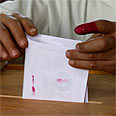
Hundreds of Islamists stone Egypt's ElBaradei
Secular contender for presidency who called referendum on constitutional amendments 'irresponsible' escapes attack near polling station unhurt
Islamists hurled stones and shoes at Mohamed ElBaradei, Nobel Peace laureate and a secular contender for Egypt's presidency, as he tried to vote Saturday in a referendum on constitutional amendments.
ElBaradei was hit in the back by a stone thrown from the crowd of hundreds but managed to escape unhurt and slammed as "irresponsible" the holding of a referendum without adequate law and order.
"We don't want you," the mob shouted, throwing stones, shoes and water at the former UN nuclear watchdog chief as he turned up at a Cairo polling station, five weeks after president Hosni Mubarak was ousted by mass protests.
"He lives in the United States and wants to rule us. It's out of the question," one of them said.
"We don't want an American agent," said another.
ElBaradei beat a retreat to his car and left without voting at the polling station in Muqattam, a largely poor district in south Cairo.
"Went 2 vote w family attacked by organized thugs. Car smashed w rocks. Holding referendum in absence of law & order is an irresponsible act," he wrote on Twitter.

Patriarch Shinoda III arrives at polling station (Photo: AP)
ElBaradei's brother Ali said he was unhurt. Muqattam is close to the scene of recent deadly clashes between Egypt's Christian Copt community and Muslims.
Members of the crowd interviewed by AFP before the assault identified themselves as Islamists without elaborating on their precise allegiance.
An official from the Muslim Brotherhood, the largest and most organized opposition movement, denied members of his group were involved.
"There are many types of Islamists. It's impossible that it was Muslim Brotherhood members, 100 percent impossible. We work with ElBaradei and coordinate with him," Gamal Nassar told AFP.
An estimated 45 million Egyptians were being asked to say "yes" or "no" to a package of constitutional changes intended to guide the Arab world's most populous state through fresh presidential and parliamentary polls within six months.
ElBaradei, a staunch opponent of the planned changes, is widely respected on the world stage for his work as an international diplomat.
'Changes don't go far enough'
But under the Mubarak regime, he came under repeated criticism for his frequent trips abroad and was accused of being out of touch with the reality of Egyptian life.
He went to vote in Saturday's referendum on constitutional reform after returning from a speaking engagement in New Delhi sponsored by India Today.
The main advocates of a "yes" vote have been the Muslim Brotherhood -- powerful and well-organized despite being outlawed under Mubarak -- and elements of the former ruling National Democratic Party.
Critics say they are the ones who stand to benefit if elections are held too quickly, without giving time for groups stymied by three decades of authoritarian rule to organize at grass roots level.
Monitors said the voter turnout exceeded expectations, but did not offer an exact number. Egyptian media outlets said the referendum was conducted in a relatively calm atmosphere, as opposed to the irregularities and violence reported during the parliamentary elections in October.
The president of Al-Azhar University and former Mufti of Egypt, Dr. Ahmad Al-Tayyeb also voted in front of the cameras, as did the leader of Egypt's Coptic community, Patriarch Shinoda III.
On Friday thousands of people gathered in Cairo's Tahrir Square, the symbol of the struggle that led to Mubarak's fall, to protest against the suggested amendments to the constitution. The demonstrators said the changes, if implemented, would not be enough to make Egypt a true democracy.
If the changes are rejected, the military will have to go back to the drawing board and may extend the six-month deadline it had set for handing over power to an elected civilian government.
A "yes" vote could mean parliamentary and presidential elections to be held before the end of the year. But critics say that timeframe is too rushed and will only benefit the party of ousted President Hosni Mubarak and the Muslim Brotherhood, the two largest and best organized political forces in the country.
Regardless of the outcome, the referendum gives Egyptians their first taste in decades of a free vote and will likely be remembered as a milestone in Egypt's road to democracy after Mubarak's 29 years in power. Under Mubarak, elections and referendums were plagued by widespread vote fraud to ensure regime victories.
The proposed amendments include a limit on presidents to two, four-year terms and allow independents and opposition members to run for the country's highest office, ending what had been heavy restrictions on who could be a candidate for president. The changes also ban anyone who has dual nationality, one foreign parent or a foreign wife from running.
The amendments would restore full judicial supervision of elections, seen as key to preventing fraud. They also put limits on the emergency laws that have been in place for 30 years and give police near unlimited powers: Under the new rules, a referendum would be required to extend emergency law beyond six months.
But critics say that doesn't go far enough. They contend the entire constitution must be scrapped and a new one drawn up to guarantee that Egypt is spared future dictators. Egypt has been ruled by men of military backgrounds since 1952 and the current constitution outlines a system that puts overwhelming power in the hands of the president.
AP contributed to the report
- Follow Ynetnews on Facebook










